
The Oil of Corruption
June 30th, 2018
Oil is nasty stuff. Not coconut oil or olive oil, of course. I am talking about petroleum – crude oil, light sweet oil (sounds tasty, but not), Brent crude, and so on. I just read on a travel page that guests at an Azerbaijani hotel bathe in the stuff, believing it to have therapeutic qualities. How unpleasant it must be to sink into a bath of crude oil; and how do you clean it off afterward? All slippery, like dark treacle. The Azerbaijanis call it “the thick blood of the Earth.”
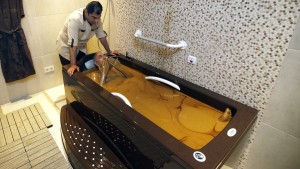
Bathing in crude oil: Around 15,000 people a year travel to the Azerbaijani town of Naftalan to bathe in the local oil, reputed to have unique medicinal properties. (Photo: CNN)
As the Petrojam “scandal” continues to unfold, it struck me the other day how closely linked the petro-world and the corruption-world are. Here in Jamaica, the 2006 Trafigura scandal, involving a Dutch company that lifted Nigerian oil to Jamaica, continues to haunt five members of the People’s National Party, who have taken their appeal to the UK Privy Council in a last-ditch attempt to avoid testifying in court on the matter.
Talking of Nigeria, one of the biggest corruption trials ever opened in Italy earlier this year, involving Royal Dutch Shell and the Italian energy company Eni and alleged bribes for the rights to explore a very large offshore oilfield. Over in Venezuela, lawsuits have been flying. Venezuelan state oil company PDVSA has accused several oil traders (including Trafigura) of corruption. Also in our hemisphere, Petróleo Brasileiro, Brazil’s state-controlled oil company, has ensnared many in its tentacles, including two former presidents and even the current one. Petrobras agreed to pay nearly US$3 billion to settle a shareholder lawsuit in the U.S. in January of this year.
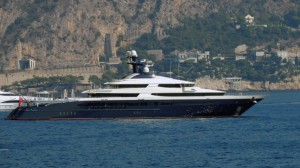
This super yacht was seized by Bali police earlier this year in connection with corruption charges. (Photo: Abxbay/Wikimedia Commons)
The sums are large, the stakes are high. The sad thing is, however, that while the oil-corrupt wallow in yachts, Rolex watches, political party donations and prostitutes, the possession of oil itself seems to bring no joy to the people. According to a very recent report from the Brookings Institution, Nigeria has now taken over the “top spot” from India as having the largest number of its population living in extreme poverty – an estimated 87 million Nigerians, about half the country. The mere presence of oil, instead of putting money in people’s pockets, has caused untold suffering. The country’s current President has accused its young people of being lazy, which has angered this large percentage of the population; but maybe, just maybe, it was its former political leaders, who sat back and squandered the oil dollars rolling in. Perhaps they even bathed in it.
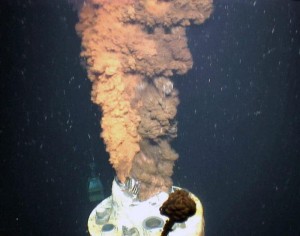
The Deepwater Horizon oil rig explosion and oil spill in the Gulf of Mexico took the lives of 11 people and caused the discharge of an estimated 4.9 million barrels of oil into the Gulf, resulting in the largest environmental disaster in U.S. history. (Photo: U.S. Geological Survey via WHOI)
Then there is the environmental harm caused by oil and the search for it. This is undeniable and in some cases irreversible. I first started blogging at the time of the BP oil “spill” in the Gulf of Mexico, almost exactly eight years ago. I noted then:
To many, oil signifies not only plenty and riches, but greed, excess, conflict, oppression…Meanwhile, in the increasingly murky depths of the Gulf of Mexico, a filthy, bubbling stream of oil churns out thousands of gallons – every second, every minute, every hour of every day. It is pouring constantly while we are sleeping, eating our dinner, traveling to the office. Watching the video clips of this dark eruption, I feel a heavy sense of doom. In one clip, I saw a ghostly white fish, an eel perhaps, twisting and turning in the midst of it. A sad and despairing image.
So, oil actually inspired my first blogging efforts. Back in the Niger Delta, it will take decades to clean up the widespread contamination of wetlands (and thus, water and drinking water that has poisoned many). The soil is polluted up to five meters deep in areas such as Ogoniland. Wildlife has been devastated.
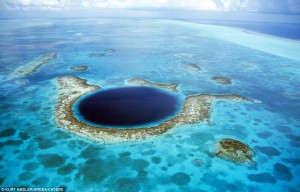
The Blue Hole in Belize is a divers’ paradise, with caverns filled with stalagmites and stalactites and many other wonders. (Photo: Kurt Amsler)
The Caribbean country of Belize has weighed things up and on December 29, voted to stop all new oil exploration in its waters. It has figured that its pristine and world-famous barrier reef – bringing in tourists who love to explore in and around its magnificent Blue Hole and other areas – are actually more valuable, especially in the long term.
Not so far away, Guyana is happily trekking in the opposite direction, hand in hand with Exxon Mobil. Will its recent oil discoveries bring prosperity or ruin to the people? Will it fuel political corruption, bring Guyanese emigrés flocking back, when a trickle of wealth becomes a flood? What of environmental monitoring and controls? Now Venezuela, itself struggling in an oily mire, is pushing its claim for a large chunk of Guyanese territory.
Of course, there is one answer to all of this. There is something called renewables. Oil may be the blood of the Earth, but blood can run out and weaken the body.
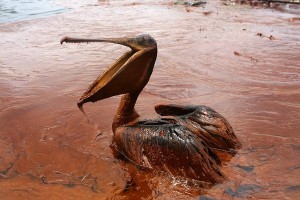
An oil-covered brown pelican sits in a pool of oil along Queen Bess Island Pelican Rookery near Louisiana in 2010.
(Photo: Sean Gardner/Reuters/File)
Tags: Belize, Blue Hole, Brazil, Brookings Institution, Caribbean, corruption, Deepwater Horizon, Gulf of Mexico, Guyana, Jamaica, Nigeria, oil, oil spill, PDVSA, Petrobras, Petrojam, poverty, Royal Dutch Shell, Trafigura, Venezuela
The Gleaner reserves the right not to publish comments that may be deemed libelous, derogatory or indecent.
To respond to The Gleaner please use the feedback form.
- We Are the Zoomers
- Living Online with Humans and Birds: NAOC 2020
- Human Trafficking and the Problem of Public Education
- Down Memory Lane
- Are We Ready to Recover from COVID-19?
- Road Safety Matters: Is Your Vehicle Safe?
- Sexual Harassment, Me Too, and the Minister’s Disturbing Giggle
- The Vulnerable Senior Citizens, Private Care Homes and COVID-19
- A Muddle Over Masks
- Here is Something Life-Saving You Can Do: Give Blood!


